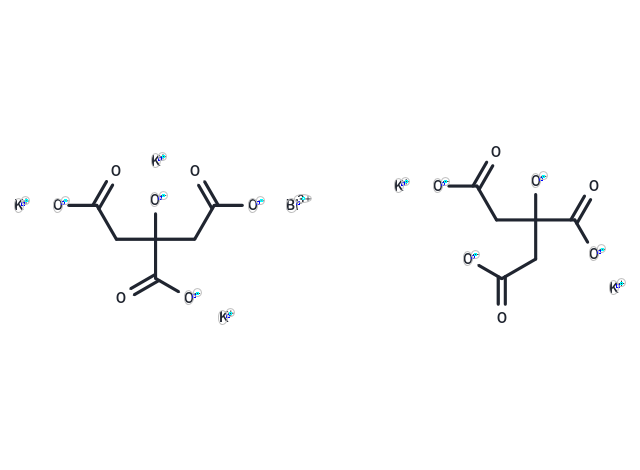Shopping Cart
- Remove All
 Your shopping cart is currently empty
Your shopping cart is currently empty

Bismuth Subcitrate Potassium is an antibiotic that acts against 12 species of Helicobacter pylori, inhibits the histamine H2 receptor, and can be used to study diarrhea and peptic ulcer disease in vulnerable patients with SARS-CoV-2 infections.

| Pack Size | Price | Availability | Quantity |
|---|---|---|---|
| 10 mg | $33 | In Stock | |
| 50 mg | Preferential | In Stock |
| Description | Bismuth Subcitrate Potassium is an antibiotic that acts against 12 species of Helicobacter pylori, inhibits the histamine H2 receptor, and can be used to study diarrhea and peptic ulcer disease in vulnerable patients with SARS-CoV-2 infections. |
| Targets&IC50 | C. pyloridis:8 ug/ml (MIC50) |
| Molecular Weight | 780.66 |
| Formula | C12H8BiK5O14 |
| Cas No. | 880149-29-1 |
| Smiles | O=C(CC(C([O-])=O)(CC([O-])=O)[O-])[O-].O=C(CC(C([O-])=O)(CC([O-])=O)[O-])[O-].[K+].[Bi+3].[K+].[K+].[K+].[K+] |
| Relative Density. | no data available |
| Storage | Powder: -20°C for 3 years | In solvent: -80°C for 1 year | Shipping with blue ice. | |||||||||||||||||||||||||||||||||||
| Solubility Information | H2O: 80 mg/mL (102.48 mM), Sonication is recommended. | |||||||||||||||||||||||||||||||||||
Solution Preparation Table | ||||||||||||||||||||||||||||||||||||
H2O
| ||||||||||||||||||||||||||||||||||||

Copyright © 2015-2025 TargetMol Chemicals Inc. All Rights Reserved.